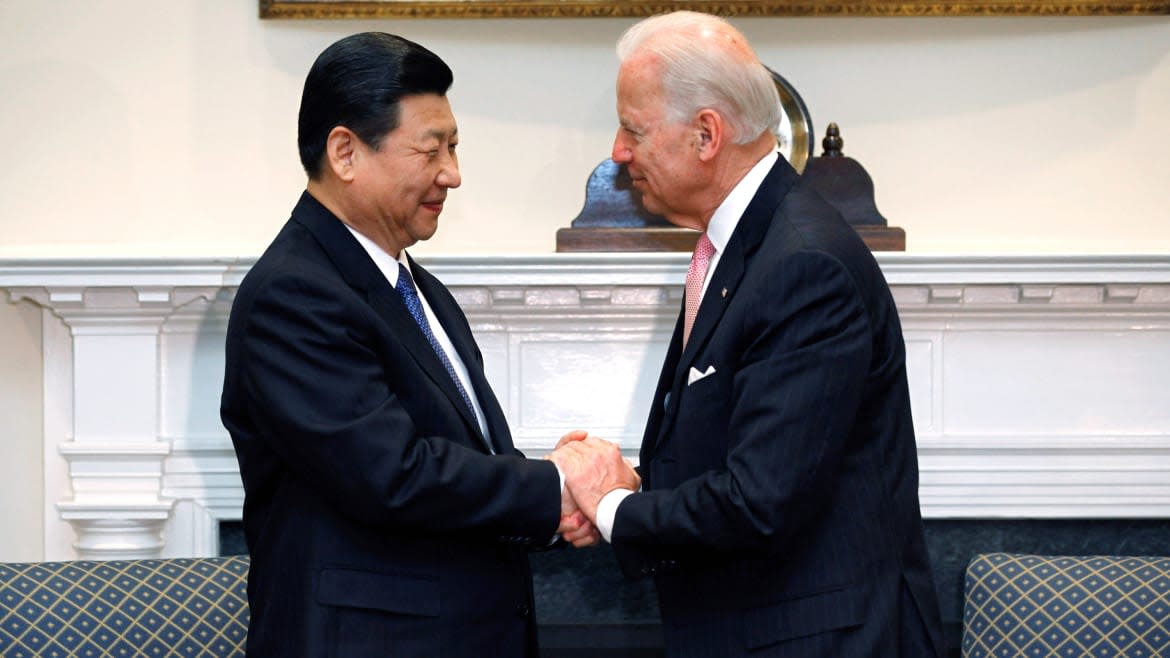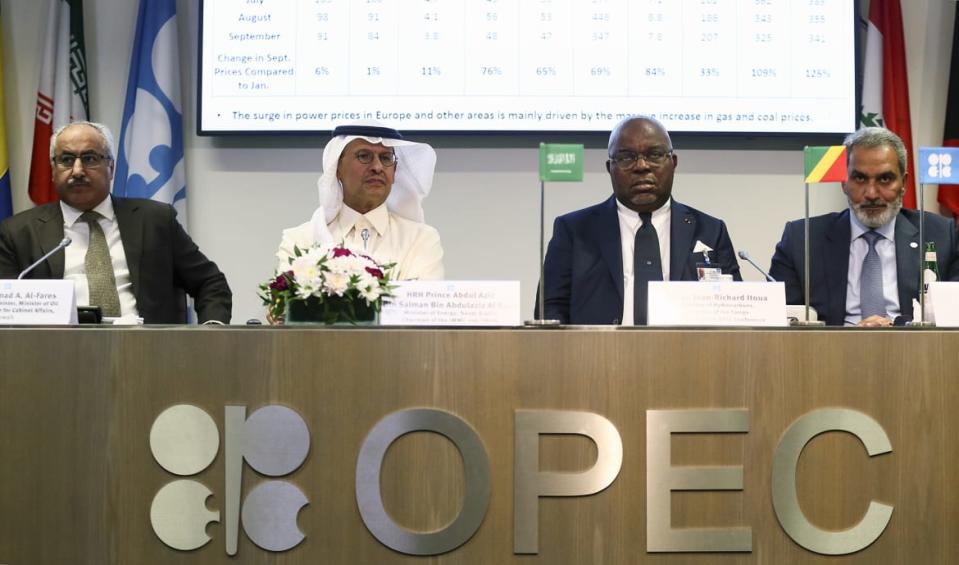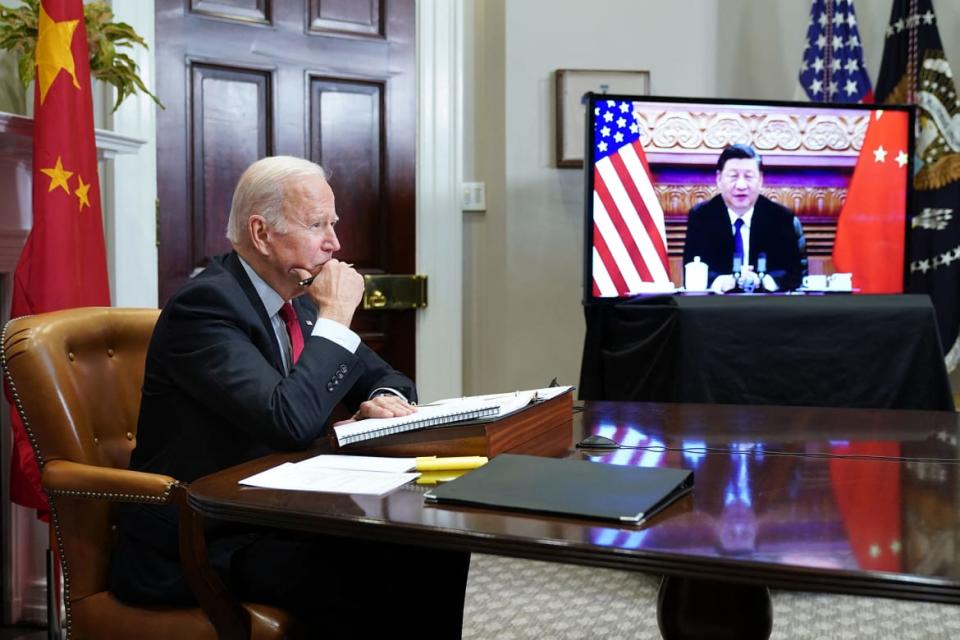Russia and OPEC Are Driving U.S. and China Into an Unlikely Partnership

- Oops!Something went wrong.Please try again later.
The past seems to exercise its own gravitational pull. Even as progress keeps nudging us forward, with all our knowledge rooted in memory we tend to see contemporary events in the light of the past rather than of the future they are relentlessly ushering in. That can be a dangerous trap.
While George Santayana famously wrote in his book, The Life of Reason: The Phases of Human Progress, that “those who cannot remember the past are condemned to repeat it,” a paradoxical corollary is also true. Those who cannot stop seeing the world primarily in terms of the past are condemned to be ill-prepared for change.
Putin Has Left the World No Other Option But Regime Change
The risks of that have seemed especially urgent this week. Major developments on the world stage have evoked defining moments of the 20th century, but seeing them primarily in that light could lead us to make the wrong choices in response to them. Helpfully, an event next week should serve as a reminder that the international landscape of the 21st century is very different from the one with which so many of our leaders are most familiar, a reminder that—if heeded—can help guide us toward smarter decisions going forward.
In recent days, headlines have echoed the crises of the past 60 or 70 years, dominated as they have been by concerns about nuclear confrontation with Russia or tensions with the oil producing nations of the Middle East. But as the Chinese Party Congress convenes next week and that country commits to its course for the foreseeable future, it should serve to remind us that geopolitics in the years ahead will be increasingly heavily influenced by the presence, the needs, the ambitions, and the weaknesses of a new and very different rival. Weighed appropriately, these factors should lead us to see the world, the risks we face and the options before us in a new way.
For example, while many analysts were quick to note that the decision by OPEC to restrict production in the months ahead—in the hope of pushing up oil prices—was a blow to the United States and the West and an aid to Russia, they neglected to note that Beijing, heavily dependent on foreign energy, was also hard hit by the decision.
That is not to minimize the fact that OPEC was consciously giving a “middle finger” to the Biden administration, knowing full well the decision was one the U.S. hoped could be avoided or postponed, and that it would have a negative effect on the political prospects of President Biden’s party in the coming U.S. elections.

Secretary-General of OPEC Haitham al-Ghais (R) and Saudi Arabia's Minister of Energy Prince Abdulaziz bin Salman Al-Saud (2nd L) hold a press conference after the 33rd OPEC and non-OPEC ministerial meeting in Vienna, Austria on Oct. 5, 2022.
Even before the decision, senior U.S. officials indicated to me that it was increasingly clear to them in the weeks and months following Biden’s trip to the region this past July, that the Saudis (and Crown Prince Mohammed bin Salman in particular) were proving to be very difficult and unreliable partners. The sharpness of the response from the administration and from Democrats on Capitol Hill nonetheless underscored that the decision was particularly unwelcome and seemed to undercut all the reasons for Biden’s visit during the summer, while boding ill in particular for future relations between Riyadh and Washington.
The fact that OPEC was casting its lot with Russia in the midst of that country’s brutal war against Ukraine also seemed to suggest that the region was choosing sides, and carried with it echoes of Cold War rivalry for influence in the Middle East, as well as past episodes in which the oil producers sought to throw their weight around. But in taking action that alienated not only the U.S. and allies from Europe to Japan, but also a China that is struggling with economic headwinds and can ill afford an oil price shock, the OPEC decision must be seen as short-sighted.
Perhaps most importantly, it serves as a vital reminder that the strongest responses the U.S. can muster toward OPEC are ones that are at least tacitly coordinated with the Chinese—and therefore also as a reminder of the dangers of viewing the U.S. and Western relationship with its rising 21st-century rival in the same way we once viewed our 20th-century Cold War rival is a mistake. Indeed, it is the fact that the aligned energy self-interests of the West and China will accelerate the push to reducing worldwide demand for fossil fuels that will ultimately doom to increasing irrelevance the once swaggering petrostates.

Gasoline prices in Los Angeles County, California, on Oct. 3, 2022.
That is not, of course, good news for Russia, which the late Senator John McCain once characterized as a “gas station masquerading as a country.” As such, it is a reminder of the fact that should the U.S. and China find ways to collaborate on progress toward green energy innovation and combating climate change, it will have the effect of weakening Russia.
At the same time, Russia’s increasing dependency on current Chinese energy demand—while many of its customers reduce their dependence on its energy resources due to Ukraine-related sanctions—gives China increasing power over Russia. That influence is amplified by the fact that Russia as a pariah state with clear and growing social, economic, and military weaknesses needs its partnership with China to remain relevant as a “major power.”
For these reasons, the U.S. and our allies have wisely sought to reach out to China to help constrain Russia’s behavior in Ukraine. The success of that effort to date—which has included discouraging China from providing arms to Russia to assist with its invasion—shows a recognition of that shifting power dynamic in this new era.
Putin’s Headed Toward Defeat in Ukraine. The Only Question Is How Bad a Loser He’ll Be.
That dynamic is especially important in light of the other flashback to 20th-century threats this past week, President Biden’s comment on Thursday regarding the nuclear threat posed by Putin that “We have not faced the prospect of Armageddon since Kennedy and the Cuban Missile Crisis.” Biden also said that he did not feel Putin could use tactical nuclear weapons and “not end up with Armageddon.”
Evocative of the worst days of the Cold War as Biden’s remarks were, they should not produce the kind of eyeball-to-eyeball confrontation that marked the Cuban Missile Crisis and the darkest moments of that period. That is because not only is Russia comparatively weaker (as has been demonstrated in Ukraine) and the West comparatively stronger, but also because Russia is clearly the junior partner in its evolving relationship with China. And in respect to that relationship, for Russia to use nukes would be both anathema to China’s need to maintaining global stability so it can focus on the economic issues that are pivotal to its own cohesion as a nation. Further, of course, Russia using a nuclear weapon would undermine China’s security interests as the resulting response to Russia would undoubtedly profoundly weaken a security ally on which the Chinese had been hoping they could depend.
In other words, China no more wants Russia to go nuclear in Ukraine than we do.

President Joe Biden meets with China’s President Xi Jinping during a virtual summit from the White House in Washington, DC, Nov. 15, 2021.
And that is something that we and our allies can work within helping to manage this situation—just as working with China will be essential to addressing many other central issues of the decades ahead. This includes the climate crisis (as cited above) to pandemics, and from regional conflicts to regulating and securing the internet and next generation technologies.
This Sunday, in Beijing, the 20th National Party Congress of the Chinese Communist Party will convene. For the near term, this once-every-five-years event will cement the power of Chinese President Xi Jinping and confirm his status as China’s most potent leader since Mao Zedong. It will also, however, give insights into both how he intends to hold onto that power, and who might be positioned to someday succeed him. You can also expect further expressions of China’s ascendant role on the world stage and Xi’s clear intention to use that role to assert Chinese influence and shore up its economic and political strength in the years ahead.
Almost certainly, reaction to Congress will trigger the significant faction among U.S. officials, analysts, and commentators who view the future of America’s relationship with China as a second Cold War. Again, such a 20th-century framing is a mistake.
As Bad as the World Looks Right Now, It’s Actually Worse
For the reasons cited above, the U.S. and the West have far more shared interests with China—and far more need of China to use its influence to support our goals—than we ever did of or with the Soviet Union. Further, with 70,000 U.S. businesses in China and our economic fates deeply intertwined, zero-sum Cold War thinking is completely inappropriate here.
As the past week has shown, and the next one will underscore, the future demands we set aside the models and biases of the past. That future will not be less complex but it will be differently complex. Finding a way to manage a relationship with a new rival with whom we share many interdependencies is one complexity we must master. Understanding that rival’s needs and relationships with the rest of the world is another. Understanding how new technologies will reshape economic and geopolitical relationships and the nature of power itself is a third.
This past week has evoked echoes of Michael Corleone, as events seemed to be saying “just when we thought we were out of the 20th century, it seemed to pull us back in.”
But that was an illusion and a deeply misleading one at that. It is important that as we consider the big challenges of this moment and of the future, we do so keeping in mind the perspectives of the players with whom we will be forced to contend—and who will seek to lead alongside us or in our place on the global stage rather than being distracted by the Putins and the old school petrocrats who are fighting for a last moment of relevance before being consigned to history’s dustbin.
Get the Daily Beast's biggest scoops and scandals delivered right to your inbox. Sign up now.
Stay informed and gain unlimited access to the Daily Beast's unmatched reporting. Subscribe now.

